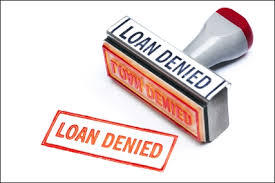We see these mistakes over and over again. To people in the lending business, it's so commonplace we shake our heads when we see it happen, and it's almost always fatal to the loan in process when these things happen. Don't get caught making these mistakes. Be prepared and be warned.
1. Your Home is Under Construction
Any form of construction in process during an appraisal will halt the loan process. This is especially true of missing sinks and toilets. You must either hold off on your home improvements until after the loan funds or finish it before the loan starts. Keep this timing in mind and plan accordingly.
2. You Leased or Financed a Major Purchase
Really, you picked now to get a new car? I know, you needed it, the lease was up, your daughter just turned 16, whatever. Bottom line, NO NEW CREDIT. That means no new credit cards either. If your lender decides to do a credit refresh for some reason and finds a new loan on your credit report, you may fall out of the acceptable debt-to-income range. Don't take a chance. Wait.
3. You Co-Signed for Someone
Your family or clients come to you for everything. So many borrowers don't seem to fully comprehend how co-signing affects their credit. In a word, if you co-sign, you get all the responsibility of the loan but none of the benefits. The debt will be added to your debt ratio - and so will the late payments, delinquencies or other problems attached. Plus new debt affects your FICO score more negatively than old debt. Taking on someone else's debt is a big responsibility. If you're going to do it, do so with eyes wide open.
4. You forgot to mention that business that's reporting losses or alimony or . . .
People always try to be selective in the information they share with lenders, but the lender always finds out. How? It's in your paperwork - usually in your bank statements. Lenders will want to see the most recent 2-3 months bank statements. When they see money coming and going that's unusual or recurring, they will question where it came from and ask to see those statements as well. You can save yourself a lot of headache, explanation, and extra documentation if you keep your money movement to a minimum prior to and during the loan process. Don't think that just because you don't tell, they won't find. You're much better off disclosing upfront and allowing your loan officer to structure around any potential challenges.
5. You left your job
Before your loan closes, your lender will verify your employment. If your employment income is used to qualify you for the loan, don't take a sabbatical or decide to be "in between" jobs until after closing. This is a deal breaker with no workarounds. No income = no loan.
While some of this may seem obvious, we see it so often that a reminder is worthwhile. Take heed, and if you're planning to buy a home or refinance in the near future, consider this a checklist to prep you for the loan. Consult with a reputable experienced lender, be open about your financial situation, and you should be fine.
Cindy Tansin is a mortgage professional, author of the book Lead With Your Heart and the Rest will Follow, and a regular blogger on Huffington Post and LinkedIn. Her expertise is in promoting personal growth, professional growth, and financial soundness.

